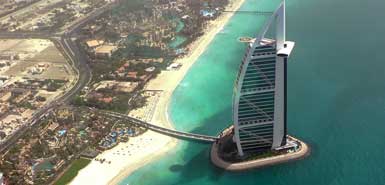A noxious tide of toilet paper, raw sewage and chemical waste has transformed Dubai’s most prestigious stretch of shoreline into a foul-smelling health hazard.
A stretch of the exclusive Jumeirah Beach – a magnet for Western tourists and home to a string of hotels – has been closed.
“It’s a cesspool. Our tests show too many E. coli to count. It’s like swimming in a toilet,” said Keith Mutch, the manager of the Offshore Sailing Club, which has posted warnings and been forced to cancel regattas.
Related articles:
– Arab countries have lost $2.5 trillion in the past four months
– Once Booming Dubai Goes Bust
– Gulf stocks plummet in turbulent year; Dubai shedding almost three quarters of its value
The pollution is a blow to Dubai’s reputation as an international holiday destination offering almost guaranteed sunshine and clear seas.
The debate over who is to blame is also turning toxic, pitting the city’s wealthy expatriates against local authorities, who have been criticised for failing to stop lorry drivers dumping human and industrial waste into the ocean.
The row also illustrates how Dubai’s rapid development threatens to outpace the Emirates’ ability to enforce environmental standards, angering the foreigners that the boom town seeks to attract. Mr Mutch first detected trouble during a walk on the beach last summer.
“The stench was unbearable and the water was a muddy brown. There was toilet paper in the sand,” he recalled.
He traced the sludge to a storm drain, buried behind a pile of rocks near the dock. It was spewing effluent into the sea.
He followed the drain several kilometres inland to the Al Quoz industrial area, which houses the cement, paint and furniture factories that have helped to fuel the city’s rapid growth.
There he discovered that dozens of sewage lorries carrying human waste from Dubai’s 1.3 million inhabitants emptied their tanks into storm drains such as the one leading to the sailing club. The drains, all connected, were built to carry excess water that falls during Dubai’s short rainy season.
According to some truckers – mostly poor workers from southern Asia – illegal dumping of waste is a purely financial decision.
In interviews, several said that they were paid by the truckload to collect waste from the city’s septic tanks and transport it to the only sewage treatment plant in the area.
This involved a long drive into the desert with lengthy queues at the end – so they opted to dump their loads in the storm drains.”We are paid so poorly, we have no other choice,” said one driver, who insisted on remaining anonymous.
Mr Mutch spent several nights documenting the illegal dumping. He sent letters and photographs to the municipality and departments of tourism, health and environment.”
At first I was ignored,” he said – but when the local press took up the story the city took action, imposing fines of up to $25,000 and threatening to confiscate tankers and deport drivers.
City authorities have since promised to build another sewage pit as a “medium-term solution”, while insisting that the latest test results show water samples to be within safe standards.
Mr Mutch, however, disagrees, citing independent tests commissioned by the sailing club showing that the water is still badly contaminated with bacteria, human faeces and chemicals.
“The water is still not safe. It’s a bleak situation and we don’t know what else we can do,” he said.
“Because rain storms are so infrequent, the drains will remain contaminated for many months to come,” said expat Thomas Aldredge. “Considering the hot weather, there are many diseases that could begin to flourish, including cholera.”
“It is shocking that Dubai does not seem to have the will to address this most fundamental of problems.”
January 29, 2009
Source: The Times
